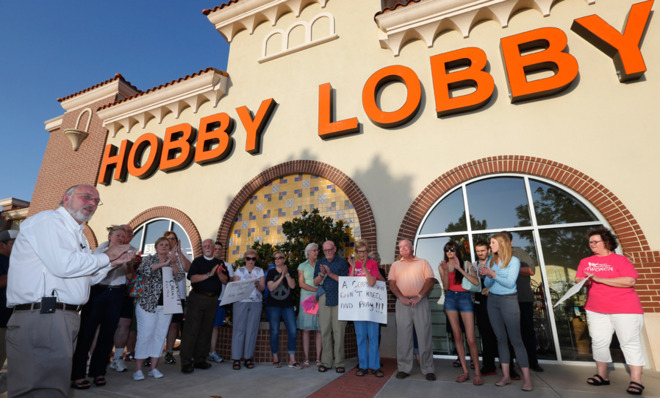Why the Hobby Lobby decision is bad for business
It turns out that religious freedom comes at a cost

A free daily email with the biggest news stories of the day – and the best features from TheWeek.com
You are now subscribed
Your newsletter sign-up was successful
Whatever you think of yesterday's Supreme Court decision in favor of Hobby Lobby and its wider legal implications, the fact is that closely-held private corporations like Hobby Lobby are now going to be able to decide which forms of contraception will be included in company-provided medical plans.
That will almost certainly continue for the foreseeable future so long as Washington remains divided and deadlocked.
The company sees this as primarily a matter of religious freedom, just as Hobby Lobby's opponents see it as mainly an issue of personal freedom. But it is also by definition a business decision.
The Week
Escape your echo chamber. Get the facts behind the news, plus analysis from multiple perspectives.

Sign up for The Week's Free Newsletters
From our morning news briefing to a weekly Good News Newsletter, get the best of The Week delivered directly to your inbox.
From our morning news briefing to a weekly Good News Newsletter, get the best of The Week delivered directly to your inbox.
And the evidence suggests that denying contraception coverage can hurt the bottom line. Employee pregnancies cost firms much more than contraception.
A 2000 study by the National Business Group on Health estimates that not providing contraceptive coverage in employee health plans ends up costing employers 15 percent to 17 percent more than providing such coverage, after factoring in both the direct medical costs of pregnancy and indirect costs such as employee absence and reduced productivity.
Of course, Hobby Lobby is likely to see this as a cost of doing business while remaining true to the owners' religious beliefs. If anything, it is another argument for why health care should not be mediated by privately owned businesses — both to the benefit of corporations and individuals.
Beyond that, companies can suffer other costs from denying contraception coverage to women. Hobby Lobby's business is currently benefiting from widespread media coverage and support from Republican politicians such as Mike Huckabee. It is gaining customers from ideological conservatives who wish to support a religious cause (even if Hobby Lobby's credentials as a Christian business are highly questionable).
A free daily email with the biggest news stories of the day – and the best features from TheWeek.com
But there could be a backlash, too, against Hobby Lobby and any other firm that is seen as being hostile to women's interests. Polls show 53 percent of Americans disagree with the Supreme court's decision. That would to translate into a big chunk of Hobby Lobby's business. And in general, businesses try to avoid high-publicity political fights; just ask Chick-Fil-A, which ceased funding anti-gay marriage groups when their position began to hurt their expansion plans.
Of course, none of this can counteract the wider legal implications of the case. As Politico writes:
The Supreme Court's four dissenting justices called it a decision of "startling breadth" that allows companies to "opt out of any law (saving only tax laws) they judge incompatible with their sincerely held religious beliefs." [Politico]
Sooner or later, Congress will have to address that.
Editor's note: This article has been revised since it was first published in order to more clearly include proper attribution to source material.
John Aziz is the economics and business correspondent at TheWeek.com. He is also an associate editor at Pieria.co.uk. Previously his work has appeared on Business Insider, Zero Hedge, and Noahpinion.
-
 Is Andrew’s arrest the end for the monarchy?
Is Andrew’s arrest the end for the monarchy?Today's Big Question The King has distanced the Royal Family from his disgraced brother but a ‘fit of revolutionary disgust’ could still wipe them out
-
 Quiz of The Week: 14 – 20 February
Quiz of The Week: 14 – 20 FebruaryQuiz Have you been paying attention to The Week’s news?
-
 The Week Unwrapped: Do the Freemasons have too much sway in the police force?
The Week Unwrapped: Do the Freemasons have too much sway in the police force?Podcast Plus, what does the growing popularity of prediction markets mean for the future? And why are UK film and TV workers struggling?